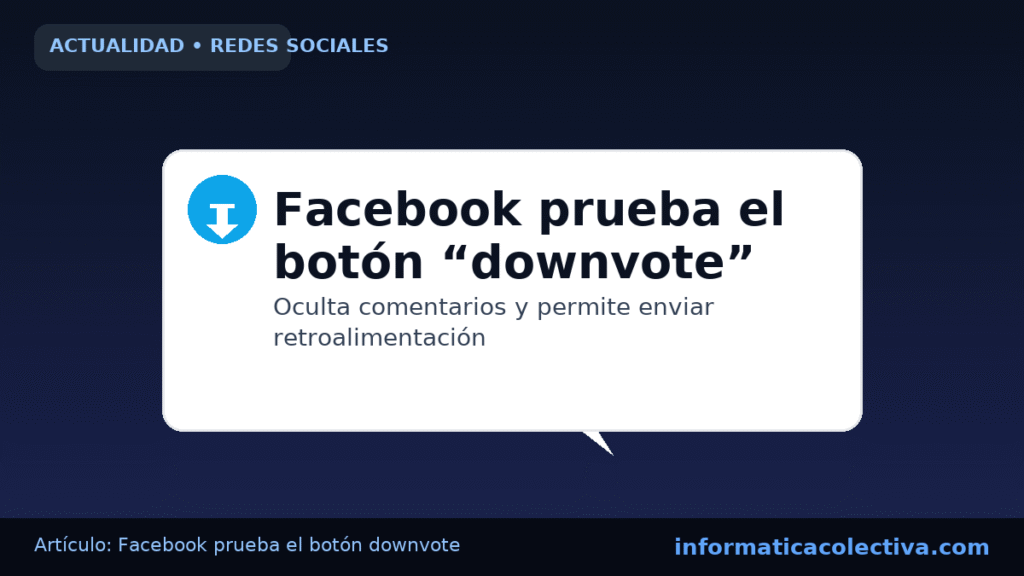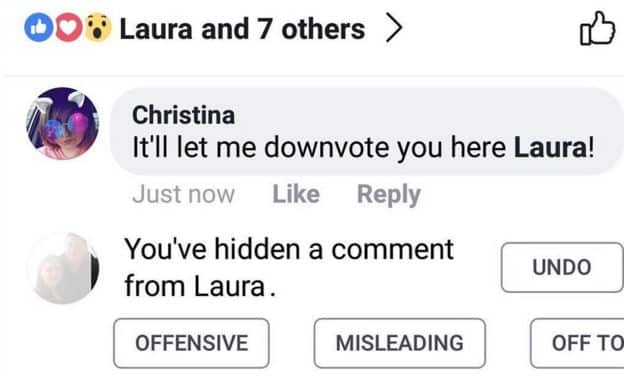Facebook prueba el botón “downvote”: qué es, cómo funciona y cómo afecta tus comentarios

Facebook ha iniciado una prueba limitada en Estados Unidos de un botón llamado downvote. No se trata de un botón de “No me gusta” —la compañía lo ha aclarado—, sino de una herramienta para moderar comentarios en publicaciones públicas. Al pulsarlo, el comentario se oculta para quien lo pulsa y se muestra un breve formulario para marcar si el contenido es ofensivo, engañoso o fuera de tema.
El objetivo es mejorar la calidad de las conversaciones y dar a la comunidad un modo sencillo de señalar incidencias, especialmente en hilos con mucha actividad. En este artículo te explico cómo funciona, qué cambia para páginas y usuarios, y qué podemos aprender de otras plataformas que ya usan sistemas de votos.

¿Qué es exactamente el botón downvote de Facebook?
- No es “No me gusta”: no afecta la puntuación global de una publicación ni muestra una reacción negativa pública.
- Está ligado a los comentarios: aparece bajo ciertos comentarios en publicaciones públicas y no bajo las publicaciones en sí.
- Oculta el comentario localmente: al pulsarlo, el comentario se oculta para ti y puedes reportar el motivo.
- Envía señal a Facebook: tu selección (ofensivo, engañoso, fuera de tema) ayuda a entrenar sistemas de clasificación y a los equipos de moderación.
Cómo funciona paso a paso
- Encuentras un comentario problemático en un hilo público.
- Pulsas Downvote (cuando esté disponible en tu cuenta).
- El sistema te ofrece tres opciones: Ofensivo, Engañoso, Fuera de tema.
- El comentario se oculta para ti; Facebook registra la señal para mejorar la experiencia.
Importante: use downvote no significa que el comentario desaparezca para todos ni que cambie de posición en el News Feed de forma inmediata. Es una señal más de relevancia y seguridad, no un “castigo” público.

¿Por qué ahora? Contexto y objetivos
En los últimos años Facebook ha incorporado decenas de medidas contra spam, acoso, desinformación y toxicidad. The downvote encaja en esa agenda: aportar un mecanismo de moderación comunitaria que complemente los reportes tradicionales y las herramientas de inteligencia artificial.
Según declaraciones a medios especializados como TechCrunch, la idea es “recibir comentarios útiles sobre los comentarios en las publicaciones públicas” y no crear un sistema de “aversión” visible al estilo de un pulgar abajo en las publicaciones.
Comparativa rápida: Facebook vs. Reddit
| Plataforma | ¿Dónde aplica? | ¿Es público? | Efecto principal |
|---|---|---|---|
| Comentarios en publicaciones públicas (prueba limitada) | No, es una señal privada | Oculta el comentario para ti y envía señal de calidad | |
| Publicaciones y comentarios | Sí, el conteo es visible | Sube/baja la visibilidad por votos de la comunidad |
Impacto para administradores de páginas y creadores
- Cultura de comunidad: fomenta normas claras de participación (Netiqueta) y fija expectativas en comentarios.
- Moderación más ágil: the downvote te da señales para priorizar hilos con problemas sin leer todo.
- Menos ruido: ayuda a reducir off-topic y discusiones incendiarias, mejorando el CTR & tiempo en página.
Sugerencia práctica: añade un primer comentario anclado con tus reglas de participación y una invitación a usar downvote cuando sea pertinente, además de los reportes formales cuando haya incumplimientos graves.
Buenas prácticas para usuarios
- Primero evalúa: ¿es realmente ofensivo, engañoso o solo una opinión distinta?
- Usa el botón con criterio: marca engañoso cuando veas datos falsos, ofensivo para ataques o lenguaje de odio, fuera de tema si desvía la conversación.
- No alimentes el fuego: evita responder con ataques; oculta, reporta y sigue con la conversación de valor.
Preguntas frecuentes
¿Es lo mismo que “No me gusta”?
¿Baja el alcance de mis publicaciones?
¿Está disponible fuera de EE. UU.?
Conclusion
The downvote es un paso más hacia conversaciones más útiles y seguras en Facebook. Si eres administrador de páginas, aprovéchalo para guiar a tu comunidad, reducir el ruido y priorizar hilos sanos. Si eres usuario, úsalo con responsabilidad: tu señal ayuda a que lo bueno destaque y lo dañino pierda espacio.
Lecturas relacionadas en el sitio
- Cómo evitar comentarios tóxicos en redes sociales (guía práctica)
- Privacidad y seguridad en Facebook: ajustes que sí importan

Write us a comment: